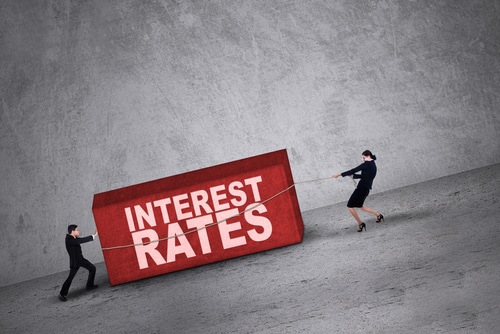Interest Rates: Are They About to Go Up or Go Down Further?
One of the biggest questions on everyone’s minds at the moment, and a key marker in the property industry, is what is going to happen to interest rates. Here we are taking a look at the steps buy to let investors may consider taking in light of the current interest rate situation, and also examining what might happen to interest rates over the coming months.
At homes2let, we have a vested interest in all aspects of the property market. Staying on top of key movements helps us provide crucial advice to the landlords and letting agents we serve, many of which rely on us for strategic guidance when it comes to making investment portfolio decisions.
One of the biggest questions on everyone’s minds at the moment, and a key marker in the property industry, is what is going to happen to interest rates.
For those buy to let investors who have financed their purchases through a mortgage, this is an especially important consideration. Is it time to lock into a fixed rate? It’s also an important factor for anyone who’s been seeking to add to their portfolios. Is now the right moment? Further, for those relying on interest rates to buoy pension investments, a close eye has to be monitoring what could effectively have a huge impact on the future.
Here the property specialists at homes2let take a look at the steps buy to let investors may consider taking in light of the current interest rate situation, and examine what might happen to interest rates over the coming months.
What is the current Bank of England interest rate?
The Bank of England (BOE) applied emergency interest rate cuts on the 11th and 19th March 2020 in response to the coronavirus situation and its economic impact. Rates were first slashed from 0.75 per cent to 0.25 per cent, with a further drop to 0.1 per cent leaving them as the lowest on record.
The BOE has stressed that the interest rate cut is only a temporary measure and that it is very unlikely to make any further cuts. This is because it is keen to keep rates above 0 per cent.
So, what should property investors be doing right now whilst rates are low? And when are they likely to rise again?
Should you fix your mortgage rate now?
With the base rate so low, buy to let landlords on variable mortgage rates may be thinking about fixing their interest rates now whilst the base rate is at its all-time low. And those on higher fixed rates may be considering moving to a product that offers a lower rate. Many will be of the view that as soon as there is the slightest inkling that the BOE may put the base rate up, all those very special deals that are currently out there could disappear in a flash. This does tend to happen.
Also, if you have based your yield on what you are paying right now, you’ll need to consider how it will be impacted should your outgoings suddenly increase. Affordability may also be an issue, especially if you have been pressured into dropping your rental rate in response to the financial pressures of the COVID-19 situation.
But will interest rates go up, or will they drop further? Is it worth fixing when the rate may go down?
How to tell if interest rates will go up or down?
The Bank of England utilises various economic indicators when making decisions on interest rates. It is therefore important to be aware of the key economic indicators when considering whether interest and mortgage rates will go up or down.
Here are the top indicators to keep tabs on, although for the short term, the pandemic situation will of course remain the biggest influence.
Economic climate
The state of the economic climate will always have an effect on interest rates. Because the UK economy has slumped following the coronavirus outbreak, the BOE introduced a base rut cut to help see off a future recession. Poor economic growth tends to lower the chances of an interest rate rise. According to the Office for National Statistics, the economy shrank 2.2 per cent during the first quarter of 2020, compared to the previous quarter. That’s the worst performance since 1979. What’s more, the Bank of England has warned that the UK economy is facing its sharpest recession on record, with the impact of the pandemic prompting a downturn of 14 per cent. So, based on this, until things start to see an upturn, an interest rate rise would seem unlikely.
Inflation
UK inflation has dropped significantly recently, now resting at 0.6 per cent, well below the 2 per cent target rate. Whilst this does mean that the cost of living is higher than this time last year, if inflation stays below the official target, then the BOE may lean towards cutting interest rates, if possible. This will have the objective of encouraging economic growth.
Unemployment
The COVID-19 pandemic has impacted considerably on unemployment, with numerous large employers announcing widespread redundancies. In the three months leading up to June 2020, UK unemployment hit 3.9 per cent, although that’s probably not representative of the full extent of the situation. In fact, figures show that over 2 million people claimed unemployment benefit between March and April, suggesting that the official unemployment rate is likely to escalate. Weak employment figures tend to reduce the chances of an interest rate rise. With this in mind, a rise in interest rates seems unlikely.
Support
The Monetary Policy Committee (MPC) voted unanimously in June 2020 to keep the BOE base rate at 0.1 per cent. Such official support will traditionally have an influence on what happens to the base rate.
What next for buy to let investors?
Whilst in the very near future an interest rate rise seems unlikely based on all these factors, there is little to say there will be a drop either.
Our experts here at homes2let can only make suggestions as to what might be the best way forward when it comes to fixing interest rates. The wise thing to do is consult with a buy to let mortgage advisor, preferably one who is independent and able to recommend products from the whole of the market. They will be able to present you with a full range of options, and will show you illustrations so that you can see how different rates will affect your bottom line.
Lettings industry advice from homes2let
At homes2let, not only do we offer a reassuring guaranteed rent scheme complete with comprehensive landlord services, Croydon property investors also know they can rely on our expert industry advice provided by our highly experienced industry specialists.
To learn more about how homes2let can help support landlords and letting agents, we invite you to get in touch with our helpful and knowledgeable team.
Related Insights

What Happens When the Croydon Selective Licensing Expires in October 2020?
The current selective licensing scheme that applies to privately rented properties in Croydon is set to come to an end on 30 September 2020. The question for landlords Croydon wide is, what happens next?

Tenant Referencing Crisis on the Cards as COVID Damages Thousands of Credit Scores
The National Residential Landlords Association (NRLA) is warning of a looming tenant referencing crisis as thousands of tenants are facing damaged credit scores caused by legal action over rent arrears in the wake of the COVID-19 pandemic. As this crisis intensifies and no government help seems forthcoming, landlords are wise to seek a reliable way to guarantee their rent.

Croydon: The Best Value Borough for Property Investment in 2024
Croydon's excellent connectivity and transportation infrastructure significantly bolster its attractiveness as a prime location for property investment in 2024. The borough's strategic position, offering a mere 15-minute journey to central London and Gatwick Airport, adds immense value to its real estate market. Furthermore, the comprehensive local tram and rail network in Croydon enhances the ease of movement within the area, making it an even more desirable destination for investors.







